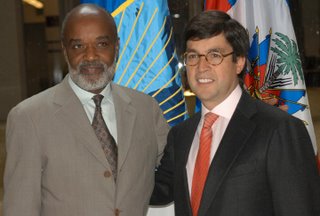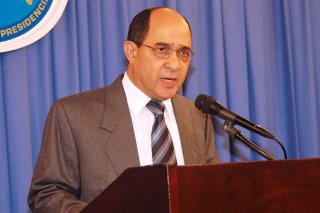 Posted on Thu, Mar. 30, 2006JAMAICA
Posted on Thu, Mar. 30, 2006JAMAICA
Jamaican leader looks to S. Florida for adviceJamaica's incoming prime minister, Portia Simpson Miller, has reached out to Jamaican Americans in South Florida for help charting a new course for her nation.BY JACQUELINE CHARLES
jcharles@MiamiHerald.comAmong the swell of well-wishers today in Kingston, Jamaica, as Portia Simpson Miller makes history, will be Caribbean prime ministers, U.S. lawmakers, diplomats and a small contingent of South Floridians wearing American and Jamaican flags over their hearts.
This group of Jamaican Americans has the distinction of being an unlikely source of advice for their homeland's seventh -- and first female -- prime minister. For more than a month now, Team Portia Florida has been meeting just a stone's throw away from Lauderhill, the hub of Jamaican culture in South Florida, with a mandate from Simpson Miller: Help chart a new course for Jamaica.
This kitchen Cabinet of sorts helped bankroll the campaign -- raising about $40,000 in South Florida -- that led to Simpson Miller's victory last month. They might well help shake things up as she forms her own government within the 68-year-old, moderately socialist, ruling People's National Party.
''We've been asked to help her formulate policy to help Jamaica,'' Lauderhill City Commissioner Dale Holness said of the group's mission.
The South Florida contingent will have to tread lightly, lest they be accused of trying to call the shots from afar. Yet Jamaica's leadership has been trying to reach out to expatriates even before Simpson Miller opened the door.
`HIGH RESPONSIBILITY'''I think it's important for her to access and solicit ideas [from] the diaspora,'' said Jamaican-American attorney Marlon Hill, who is not part of the local group. ``Having that access and opportunity to have her ear comes with a high responsibility that should be used in an effective way and in the best interest of all Jamaicans''
A popular politician who enjoys immense support from Jamaica's poor, Simpson Miller, 60, defeated three other candidates in the divisive internal party leadership race to succeed retiring PNP President and Prime Minister P.J. Patterson.
Her victory has not only raised her profile among Jamaica's 2.6 million citizens on the island, but also among South Florida's growing 148,700 Jamaican-American community.
About 100 are expected at today's event.
The local community is watching closely to see if Jamaica's new prime minister can successfully confront the island nation's rising violence and deepening poverty.
By giving Jamaica's influential emigrants a real voice in her administration, Simpson Miller is signaling that she intends to maintain some of the political hallmarks of her predecessor. Two years ago, Patterson launched the Jamaican Diaspora Foundation to mobilize the estimated 2.6 million Jamaican citizens living abroad.
Sen. Delano Franklyn, minister of state in Jamaica's Ministry of Foreign Affairs, said that by tapping the South Florida group, Simpson Miller is demonstrating that ``she will be placing greater emphasis on the overseas Jamaican community.''
During a two-day visit to South Florida last month, Simpson Miller said she recognized the contributions of Jamaicans overseas and wants their input.
''I want to ensure that I have consultation, and when I travel as prime minister, I am going to ask for meetings so that I can speak to Jamaicans,'' she said. ``For too long the people have been out there feeling that they are not part of the process.''
VARIED EXPERIENCEThe South Florida group's experience is wide-ranging, a reflection of the social, economic and political success Jamaicans have achieved locally. The core group numbers around 20 and includes experts in literacy, disaster preparedness, criminal justice, real estate, entrepreneurship, healthcare, insurance and government consulting.
''The country has produced so many talented people,'' said Geri Peterkin, a benefits and risk administrator for the city of Lauderdale Lakes and a member of its disaster preparedness team. ``If we could get some of our expertise down on the island, it would be very helpful.''
DREAMS OF HOMELike many of South Florida's estimated 654,500 West Indians -- many of whom yearn to return to their respective homelands -- Peterkin, 57, dreams of the day she can pack and move into a house ''on a mountain overlooking the water'' in Jamaica.
But the Jamaica Peterkin left 46 years ago is far different from the one that exists now.
Progress has been made, but opportunities are limited. That, along with Jamaica's reputation for having one of the highest per capita murder rates in the world -- only South Africa and Colombia were higher last year when Jamaica recorded 1,669 homicides -- has created a desperate desire by both its poor and middle class to get out.
''It's ridiculous violence,'' said Anthea Pennant Isaacs, who teaches criminal justice. ``I've worked 10 years in law enforcement. I go to Jamaica and I am always concerned about the violence.''
Confronting the violence, Pennant Isaacs says, will be Simpson Miller's toughest challenge, and one the professor is prepared to help Simpson Miller tackle.
''We need to create programs that can facilitate life-skills training for our youths and our adults,'' said Pennant Isaacs, who visits Jamaica at least three times a year.
With some 70 alumni associations, church-based charities and other groups here already doing philanthropic work on behalf of Jamaica, the South Florida group has a foundation to build on.
''The future of the country is at stake,'' said Sherna Spencer, a Fort Lauderdale immigration lawyer who left Jamaica as a teenager 30 years ago. ``I believe we need to shore up Jamaica, we need to provide an avenue for the people who want to stay.'
It's this deep desire to make Jamaica better by stemming the brain drain, Spencer said, that encouraged her to get involved.
Though many of the group members haven't lived in Jamaica for years, Spencer said that's an advantage.
''We are looking backward and seeing what is going on, and we have a different perspective to bring to the table suggestions and ideas on how things can be done more efficiently or in a different way,'' she said.
Marrying American sensibilities with the Jamaican way of doing business will not be easy, as Spencer reminded the group during a strategy session at Holness' West Sunrise Boulevard office.
A SIMPLE CHANGEBusiness owner Robert Robinson proposed what he considered a simple change that would have a huge impact: a policy to get rid of the long wait for land titles.
''I agree the wait is long,'' Spencer said before issuing this warning: ``The lawyers are going to fight you. It takes a long time, but that is how they make money.''
Confronting these kinds of special interests -- and making sure they are not duplicating efforts by myriad other Jamaica-interest groups, including the Diaspora Foundation -- will be tough. But it shouldn't be discouraging, Holness said.
''We bring to the table the experience we've learned in America,'' he said. ``We are engaged, and at this point in time we are going to continue to be engaged.''
Copyright 2006 Knight Ridder
All Rights Reserved














































